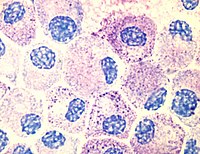
Photo from wikipedia
Protein kinase C (PKCs) isoforms play a key regulatory role in a variety of cellular functions, including cell growth and differentiation, gene expression, hormone secretion, etc. Patterns of expression for… Click to show full abstract
Protein kinase C (PKCs) isoforms play a key regulatory role in a variety of cellular functions, including cell growth and differentiation, gene expression, hormone secretion, etc. Patterns of expression for each PKC isoform differ among tissues, and it is also clear that different PKCs are often not functionally redundant, for example specific PKCs mediate specific cellular signals required for activation, proliferation, differentiation and survival of immune cells. In the last 20 years, we have been studying the role of PKCs, mainly PKCβ and its anchoring protein RACK1 (Receptor for Activated C Kinase 1), in immune cell activation, and their implication in immunosenescence and immunotoxicity. We could demonstrate that PKCβ and RACK1 are central in dendritic cell maturation and activation by chemical allergens, and their expressions can be targeted by EDCs and anti-inflammatory drugs. In this chapter, current knowledge on the role of PKC in immune cell activation and possible implication in immunotoxicity will be described.
Journal Title: Advances in experimental medicine and biology
Year Published: 2021
Link to full text (if available)
Share on Social Media: Sign Up to like & get
recommendations!